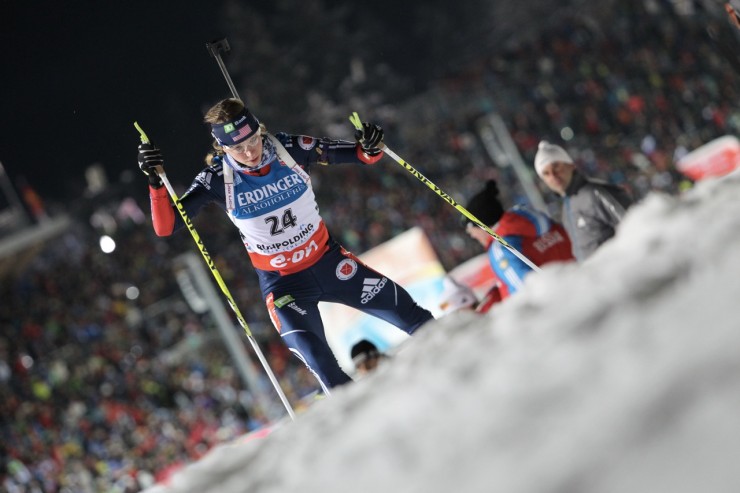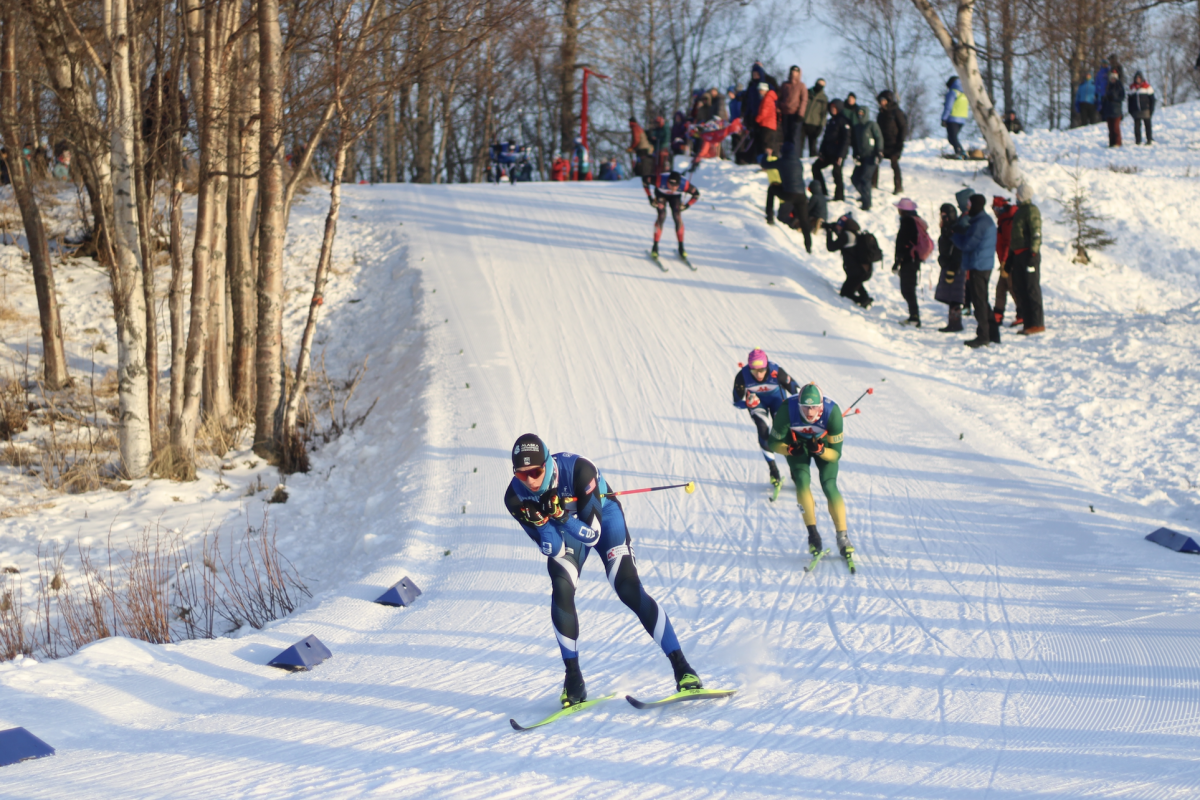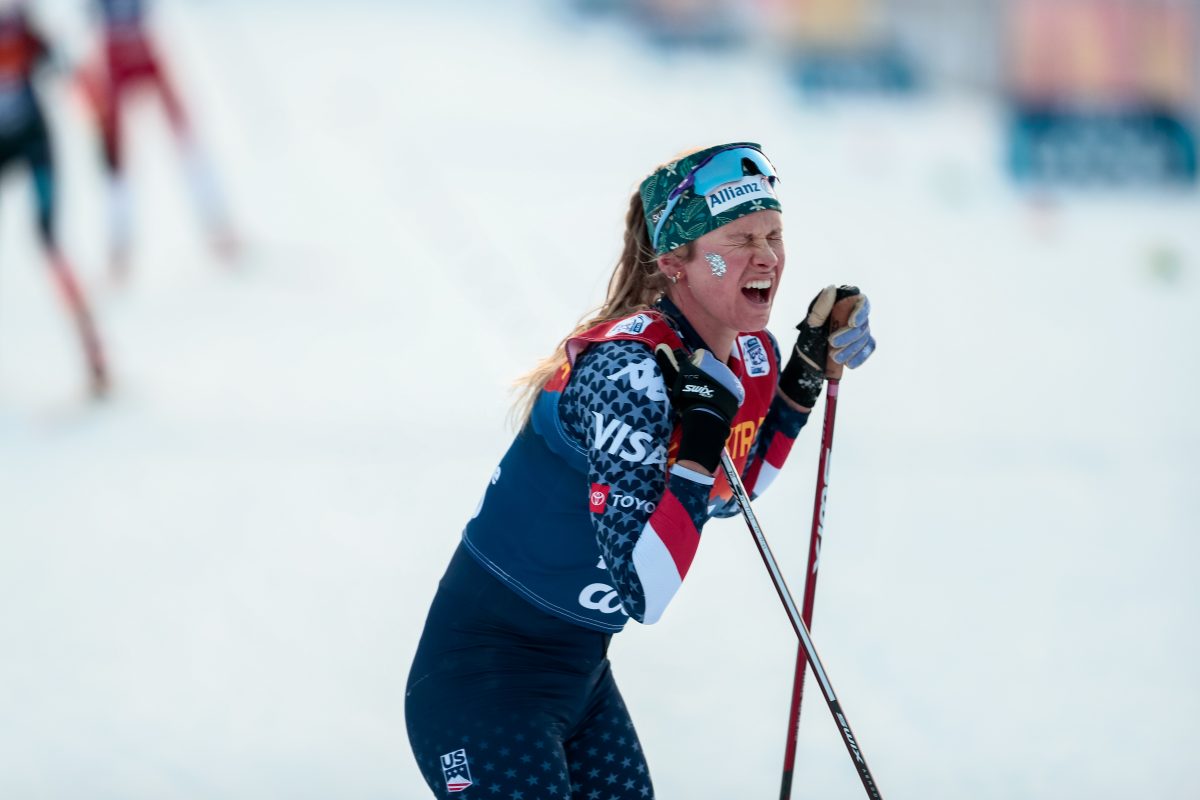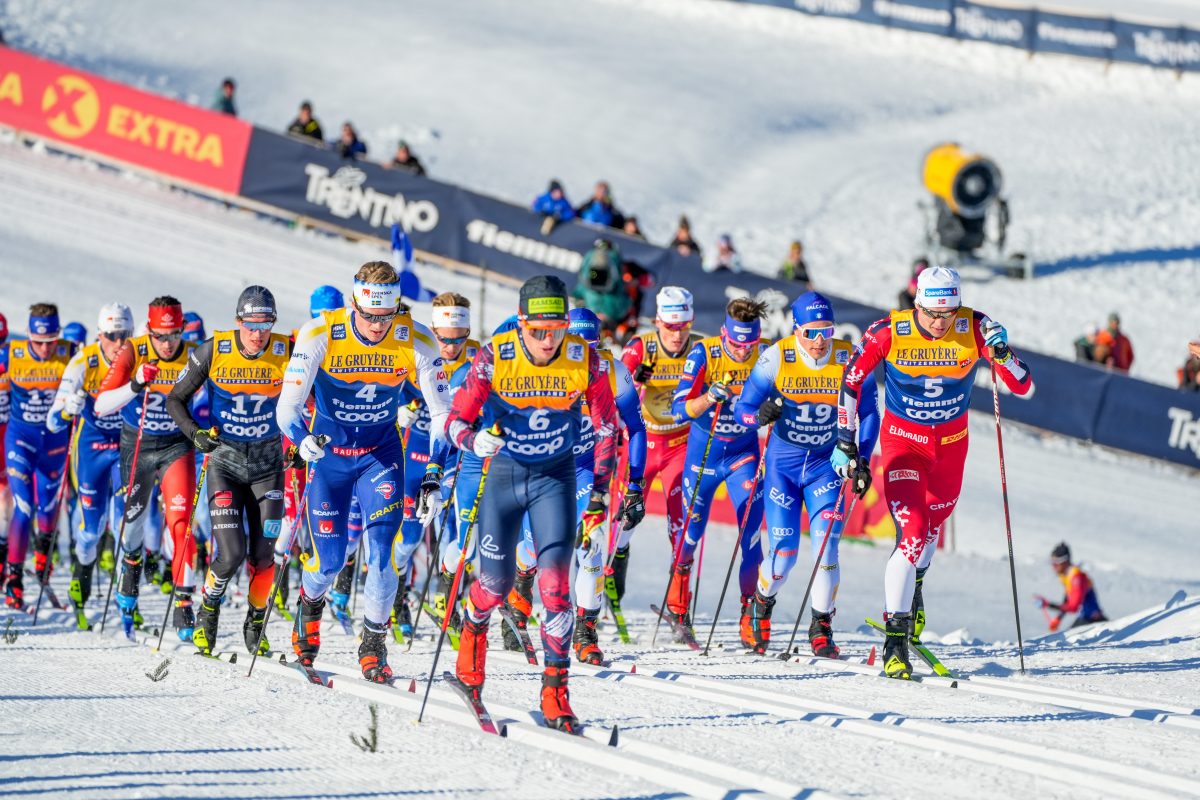
When you start out in bib five in an interval-start competition, having a goal of leading the race doesn’t seem that ambitious.
But for American biathlete Annelies Cook, there was some serious competition at the front of the field in today’s World Cup sprint in Antholz-Anterselva, Italy. Earlier this season Nadezhda Skardino of Belarus, bib three, stood on the World Cup podium. Natalya Burdyga of Ukraine, bib two, had two top-tens last season; Cook has never had one. The very first starter, Andreja Mali of Slovenia, was part of the silver-medal mixed relay at last year’s World Championships.
But that didn’t seem to faze Cook. Coming off a career-best finish of 26th in the sprint last weekend in Ruhpolding, Germany, she calmly hit her targets in prone, leaving the range just a second slower than Skardino. Shooting hadn’t been Cook’s strong point in earlier-season races, so cleaning the stage only added to her confidence.
“I am very glad to have shot well again today,” she wrote in an e-mail to FasterSkier. “I felt really relieved after cleaning prone, because I felt like I could make some mistakes in standing and still have a shot at making the pursuit. That took some pressure off for me.”
Cook missed her first shot in standing, and for a second it seemed that perhaps her shooting woes had returned. But she refocused and hit the rest of her targets – no need for that extra buffer to make the pursuit after all. By hustling her way around the final loop of the 7.5 k competition, bam – she crossed the line with the fastest time so far.
“I did have a moment in standing where I thought, okay let’s clean this one!” she wrote. “But whoops, never a good thing to do. I wouldn’t say that there is panic, but you definitely think ‘oh shit’. But I luckily stayed calm and nothing weird like shaky legs was happening, so I could still hit the rest fairly comfortably. Standing is always the trick for me.”
Of course, her lead didn’t last long. Just three bibs later Krystyna Palka of Poland bumped Cook out of the top spot. And by the time the day was done, she was a minute and 10 seconds behind the winner, Anastasiya Kuzmina of Slovakia. But the grit and determination that had put her in the lead early on paid off: Cook landed in 18th, another personal-best finish.
It wasn’t just her performance on the range that made the difference, but also her skiing. Cook was careful to approach the Antholz trails, which sit at over 5,000 feet of elevation.
“I wanted to be very aware of the effects of altitude and so I made sure to be really relaxed coming into shoot and take a little extra time with breathing,” Cook explained. “Sometimes if you are too gassed, your eyes fog up a bit and things get blurry…. skiing felt great. This is a perfect course for me with a lot of V2 and big strong skiing as well as altitude. It is a different kind of hurt when your lungs burn.”
Cook actually ended up in a three way tie with two accomplished biathletes: World Cup winner Ann Kristin Flatland of Norway and Olympic relay silver medalist Marie Laure Brunet of France.
“I wouldn’t necessarily say that the shooting monster is off my back, because I know I can shoot well,”Cook wrote. “But I also know that biathlon is such a changeable sport that anything can happen. It is a relief to have put two good races down because no matter what else, that won’t be taken away.”
In her very first World Cup appearance, Hannah Dreissigacker got off to a good start as well, cleaning prone to hit the trails again in 30th place. But after a struggle in standing left her with four penalty loops, the Craftsbury Green Racing Project athlete dropped to 88th. Working hard on the last lap, she managed to move up a few spots and finish 81st.
(She wasn’t the only racer starting her first World Cup: several bibs behind, Germany’s Olympic gold medalist in cross country skiing, Evi Sachenbacher-Stehle, missed five shots to place 78th.)
Sara Studebaker and Susan Dunklee skied consistent races, placing 46th and 49th with two and three penalties, respectively.
Overall, the whole team benefitted from the change of venues from Germany, where races were generally characterized by rain. The Italian Alps don’t have that problem.
“The sun came out!” Cook exclaimed. “I was so excited about that. It’s the first reallz sunny afternoon in such a long time. I get so much happier when the sun is shining. There is something about this venue that is just cheerful and fun – I had a lot of great cheering from the staff and wax techs too which is always a boost. Fast skis again too!”
Team Canada was led by Audrey Vaillancourt, who was seeing just her second weekend of World Cup action. Shooting clean, she placed 55th; with four penalties, veteran teammate Zina Kocher was just one spot (and less than a second) behind in 56th.
Megan Heinicke placed 68th with three penalties and Rosanna Crawford 90th with four penalties.
—
At the front, Kuzmina was all smiles as even a rifle malfunction couldn’t keep her off the top of the podium.
The Olympic sprint champion in Vancouver, Kuzmina has been inconsistent on the World Cup ever since. But today, she was unstoppable, skiing the fourth-fastest time and hitting all of her targets, unlike her closest chasers. Her shooting speed also gave her an advantage: her entire prone stage lasted just 28 seconds, among the fastest in the field.
“It is unbelievable!” Kuzmina, formerly of Russia and the sister of Anton Shipulin, said after her race. “I was surprised today!”
Starting in bib 12, Darya Domracheva of Belarus had taken the early lead with one penalty. But Kaisa Makarainen, in bib 20, was faster on her skis and four seconds faster in the standing stage, so although she also took a penalty she was able to cross the finish line with a five-second lead.
Kuzmina, however, was rolling. Wearing bib 32, she came into the standing stage with a huge advantage, but struggled with her rifle, several times breaking out of her shooting stance to shake it off and try to examine what the issue was. Nevertheless, she hit all five targets – with a few breaks in between – and still had the lead when she hit the trails. At the finish line, her margin was 16.7 seconds over Makarainen.
Several later starters tried to make a charge at the podium, but fell short. Olga Zaitseva of Russia left the range with for the final time with about the same split as the Finn, but faded on the trails. The same happened to Karin Oberhofer of Italy. Olena Pidhrushna of Ukraine seemed to have the best chance – she had four seconds on Makarainen after the last shooting – but was unable to keep up on the trails and finished fourth.
Pre-race favorites Tora Berger of Norway, who is the World Cup leader, and rival Miriam Gössner of Germany both had tough days on the range. Berger missed three shots but nonetheless managed to pull herself into 14th place.
Gössner didn’t fare so well, accumulating seven penalties. Even the fastest ski time of the day couldn’t place her any better than 62nd. As such, she missed the 60-woman cutoff for the pursuit competition and will not have the chance to score any World Cup points on Saturday, either. With her third-place finish, Domracheva vaulted past her in the ranking and now sits second.
Nadine Horchler of Germany cleaned to place fifth, the best World Cup performance of her career, proving yet again that the German women’s team has plenty of up-and-coming talent to fill the gap left by Magdalena Neuner in the coming years. Olga Vilukhina of Russia placed sixth, Marie Dorin Habert of France seventh, Oberhofer and Zaitseva eighth and ninth, and Gabriela Soukalova of the Czech Republic rounded out the top ten.
Chelsea Little
Chelsea Little is FasterSkier's Editor-At-Large. A former racer at Ford Sayre, Dartmouth College and the Craftsbury Green Racing Project, she is a PhD candidate in aquatic ecology in the @Altermatt_lab at Eawag, the Swiss Federal Institute of Aquatic Science and Technology in Zurich, Switzerland. You can follow her on twitter @ChelskiLittle.



